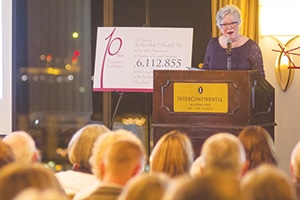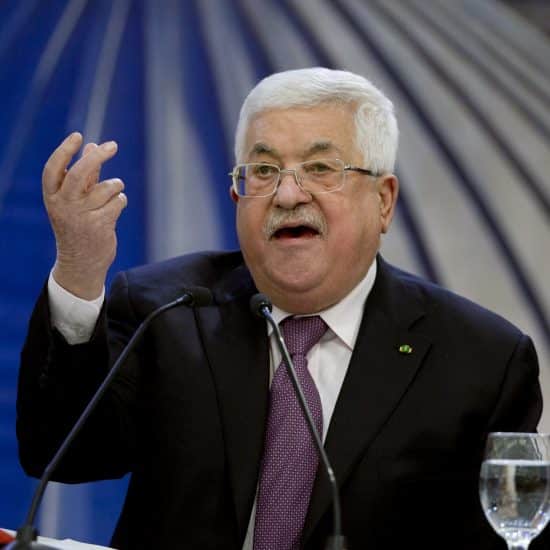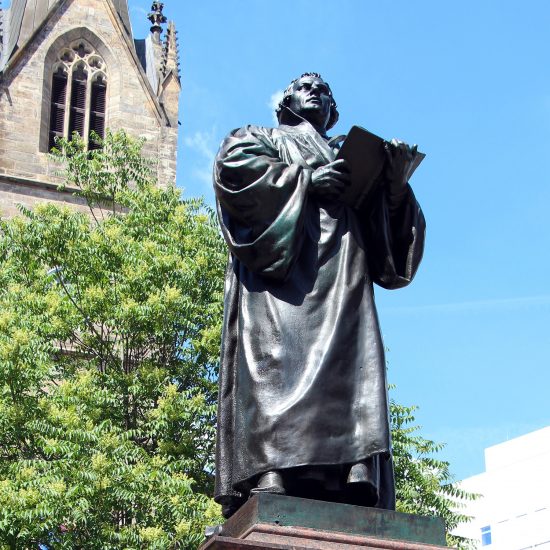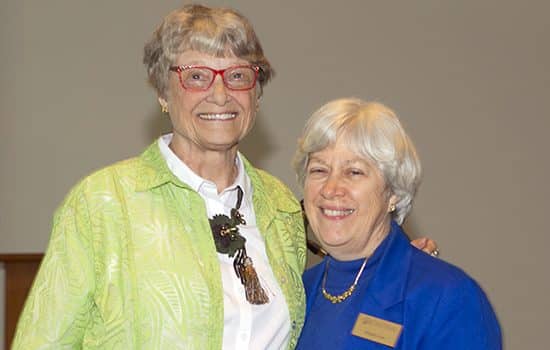R. Alan Culpepper praised former seminary staff colleague Molly Marshall as a visionary leader during a 10th anniversary celebration of her presidency of Central Baptist Theological Seminary in Shawnee, Kan., Nov. 12.
Various other staff, students, trustees and friends of the seminary also lauded Marshall at the InterContinental Kansas City on the Plaza Hotel on Nov. 12. They implemented humor, respect and affection for the leader.
 Molly Marshall responds to various expressions of appreciation at a Nov. 12 event in Kansas City, Mo., celebrating her 10th anniversary at the helm of Central Baptist Theological Seminary in Shawnee, Kan. (Francisco Litardo)Vice President for Institutional Advancement John Gravely managed to pull off the biggest surprise of the evening for the president when he unveiled an exhibit on the platform with the number $6,112,855 on it. The figure was the total of gifts and pledged to the seminary specifically to honor Marshall’s anniversary, all of it secured behind her back in the weeks and months leading up to the anniversary celebration.
Molly Marshall responds to various expressions of appreciation at a Nov. 12 event in Kansas City, Mo., celebrating her 10th anniversary at the helm of Central Baptist Theological Seminary in Shawnee, Kan. (Francisco Litardo)Vice President for Institutional Advancement John Gravely managed to pull off the biggest surprise of the evening for the president when he unveiled an exhibit on the platform with the number $6,112,855 on it. The figure was the total of gifts and pledged to the seminary specifically to honor Marshall’s anniversary, all of it secured behind her back in the weeks and months leading up to the anniversary celebration.
Culpepper traced the president’s career from her tumultuous days at Southern Baptist Theological Seminary in Louisville, Ky.
“As a seminary student with Prairie State grit and a can-do spirit, Molly immediately impressed the staid older Southern Seminary faculty, who did not quite know what to think of her,” Culpepper recalled. “But there was no mistaking that Molly was different.
“She was a free spirit, she had a passion for theology, keen academic abilities, an impressive command of the English language, and everyone knew when Molly was in the room!” he said. As the seminary’s first female theology professor, “Molly was a flame.
“Students flocked to her classes and followed her down the hall,” he remembered. “She called them her ‘goslings,’ which I suppose made her Mother Goose, but we never told her.”
“Molly was also a fighter when it came to matters of principle,” Culpepper noted. “When critics with a political agenda came after the Southern Seminary faculty, they targeted Molly in particular because their theology had no room for a woman theology professor.”
But she would neither compromise her calling nor respond in any way inappropriately, he said.
“In this crucible of conflict, Molly was a faculty leader and an associate dean for a seminary fighting for its life, its mission, its heritage and its integrity,” he said. “The lesson she learned in those years may not have helped Southern, but they would be invaluable later.”
She began her tenure as Central’s president “just as the fabric of support for theological education was unraveling,” he said. Mainline churches were declining, denominations could no longer adequately support their seminaries and the “ministry was losing its allure for young college graduates.”
None of the traditional patterns worked any longer,” he concluded. “It was truly a time for visionary leadership.
“Molly had the backbone, the conviction and the clear-sighted vision to make the hard but necessary decisions to save Central Seminary, put it on a sustainable foundation and initiate new opportunities for it to fulfill its mission.”
Marshall led the board of trustees to declare exigency with the painful consequence of letting go valuable colleagues, he said. “Then she led them to sell the downtown campus, shed financial liabilities and relocate to its present beautiful facilities. It was a daring move, but it was the right move.”
Responding to changes in the multiculturalism of American society called for a global vision and new ministry partners, he added, and the seminary responded with a new Korean studies program, a partnership with the Myanmar Institute of Theology and the Women’s Leadership Initiative that reached out to Hispanic and mid-career women. Marshall led the faculty to reimagine its M.Div. program to make it accessible to students unable to give three years as full-time students.





